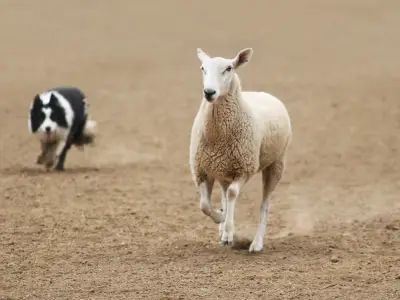They often say that dogs are man's best friend, so looking after them is important. Whether it’s keeping an eye on their health, diet, or exercise, they’re often one of their owner's top priorities.
This is certainly the case for Centre of Excellence student Sam Mansfield from Wiltshire, who’s loved dogs her entire life. She now volunteers to help friends and family with their pets, and has used the knowledge she learned to help her own dogs who weren’t getting along. Not content, she even took her teachings further to rescue a dog, who was at risk of being put to sleep.
Speaking to Centre of Excellence, Sam said: “I wanted to become the one-stop for anybody that needs canine support.”
With the current cost of living crisis, everybody is feeling the pinch, and Sam fears that people will be stuck, unable to pay for their dogs needs to be addressed. Sam added, “Dog trainers are quite expensive, so if I can help people by giving them a few tips, I can make a big difference and save them quite a few pennies in the process.”
Sam's ultimate goal is to provide comprehensive support for dog owners. By consolidating her expertise, she aims to offer a holistic approach to canine care.
Through the Canine Behaviour Training Diploma Course Sam learnt how to recognise whether a dog is scared, sad, over-excited or anxious. She also learned how to look after other people’s pets in any setting and can now recognise key body language, gestures and signals.
Here are some behaviours to keep an eye out for:
- Barking: Can be your dog’s way of giving a warning (or alert), a sign of playfulness or excitement, a cry for attention, a response to another dog, or a symptom of anxiety or boredom.
- Begging: Your dog wants what you have!
- Biting/Aggression: Biting is usually a sign of fear, pain, sickness, or a protective or defensive action.
- Chewing: Chewing can be a sign that your dog is bored, anxious, curious, or in need of some exercise. In puppies, it’s also a natural teething activity.
- Digging: Digging can be a sign of boredom, anxiety, fear or curiosity. It can also be a hunting instinct, or showcase a desire to seek comfort, hide possessions or escape.
- Jumping: Jumping can be your dog's way of greeting people, but may also be a sign of excitement, attention seeking or an attempt to steal an item that you’re holding.
- Panting: Your dog is probably too warm, but they could also be in pain.
- Destructive Behaviour: Destructive behaviour can be a sign that your dog is bored, or perhaps very stressed about being left alone.
- Sitting Between Your Legs/On Your Feet: Your dog is probably anxious or nervous, so is staying close to you.
- Yawning: Whilst a yawn can be a sign of tiredness, increased yawning could also be a sign of fear or stress.
Sam also learned how to put steps in place for behaviour modification to reduce aggression in dogs, this came in particularly handy with her own pets: “I've got two staffy pups, and one of them in particular was food aggressive and I've managed to train that out of him too.”
What can I do if my dog is stressed?
- Exercise and play
- Calming music or white noise
- Massage Therapy
- Look at their diet
But perhaps Sam’s biggest achievement is how she saved a young dog's life. Chase was abused and unable to settle down with an owner. It was feared nothing would be able to save the dog, who was at risk of being put down. As soon as Sam found out, she put her newfound tools she’d learned at Centre of Excellence into action - taking Chase in.
She remembered the first few hours with him: “He took to me pretty much straight away. He warned me with snarls, but then I corrected the behaviour, and he realised I wasn't intimidated by him. 2 hours later, his previous owners messaged to find out how he was doing. He was curled up next to me on the sofa, giving me kisses. Apparently he had never taken to anybody that fast, even after numerous visits with people, he wouldn't let anyone pet him.”
Sam’s had Chase a few months now and says they’re “making progress every day”.
- Redirect the biting: Offer the puppy a chew toy or a treat as an alternative to biting something that’s forbidden. This redirects their chewing and biting instincts to a more acceptable object.
- Use a firm tone: Without shouting or using an angry tone, firmly tell your puppy “NO BITING” (or a similar command that you prefer) when they bite something they shouldn’t. Dogs are intelligent and, although they do not understand us, using a firm tone will show them that biting is not acceptable.
- Use positive reinforcement: If a puppy listens to your command and stops biting, you can (and should) reward their good behaviour with cuddles and treats!
Sam has shown how studying at Centre of Excellence can help people improve the lives of their four-legged friends. Through our courses, she’s saved a dog's life, eased the pain and discomfort of others, and started an exciting new career in something she’s deeply passionate about.
Whether it's to start a new path in life or study something you're fascinated by, with thousands of courses available, there’s something for everyone at Centre of Excellence.
If you’re interested in learning more about Canine Behaviour, consider enrolling in our accredited Canine Behaviour Training Diploma Course, available now for just £29 (save £118!).




